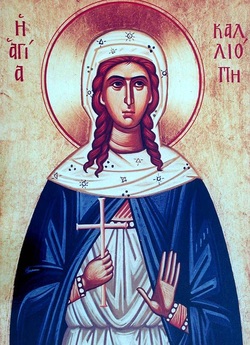
Soon after the birth of her son Theoklia was widowed. When St Calliopius reached adolescence, a fierce persecution against Christians began. Theoklia, learning that her son would be denounced as a Christian, sent him to Cilicia in Asia Minor.
When the saint arrived at Pompeiopolis, Paphlagonia there was a celebration in honor of the pagan gods. They invited the youth to take part in the proceedings, but he said he was a Christian and refused. They reported this to the prefect of the city Maximus. St Calliopius was brought before him to be tried. At first, he attempted to persuade Calliopius to worship the gods, promising to give him his own daughter in marriage. After the youth rejected this offer, Maximus subjected him to terrible tortures. He ordered the martyr to be beaten on the back with iron rods, and on the stomach with ox-hide thongs. Finally, the prefect had him tied to an iron wheel, and he was roasted over a slow fire. After these tortures, they threw the martyr Calliopius into prison.
When Theoklia heard about the sufferings of her son, she wrote her last will, freed her slaves, distributed her riches to the poor, and hastened to St Calliopius. The brave mother gave money to the guard and got into the prison to see her son. There she encouraged him to endure suffering to the end for Christ.
When on the following day the saint refused to renounce Christ, Maximus gave orders to crucify the martyr. The day of execution happened to be Great Thursday, when the Savior’s last meal with His disciples is commemorated.
Theoklia begged the guard to crucify her son head downward, since she considered it unworthy for him to be crucified like the Lord. Her wish was granted. The holy martyr hung on the cross overnight and died on Good Friday in the year 304.
When the holy martyr was removed from the cross, Theoklia gave glory to the Savior. She embraced the lifeless body of her son and gave up her own spirit to God. Christians buried their bodies in a single grave.




